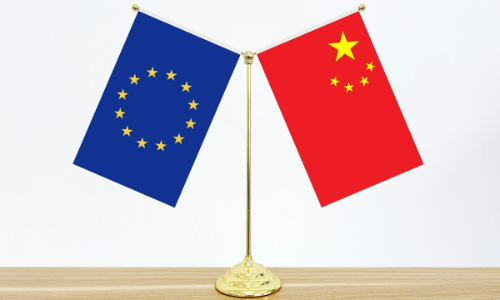
China EU Photo:VCG
Chinese manufacturers have responded strongly to EU’s escalated protectionist move targeting new energy-related products, including the latter’s probe into Chinese wind turbines and a solar panel project, warning that such actions are disturbing and will backfire.
The EU published on Monday two summary reports concerning the second and third in-depth Foreign Subsidies Regulation (FSR) investigations involving Chinese companies related to a Romanian solar plant project, said the China Chamber of Commerce to the EU (CCCEU) in a statement sent to the Global Times on Monday.
The FSR, notoriously known as a “new tool of economic coercion,” with China being its main target, interferes with the lawful economic operations of Chinese companies in the EU new energy market.
As FSR represents a new protectionist barrier against China, observers say it is counterproductive not just for the normal business operations of Chinese businesses but also affecting the market confidence to the bloc as well as the green transformation there.
The CCCEU has restated its firm opposition to the European Commission's use of the FSR as a means to economically pressure Chinese companies operating in the EU, particularly impacting the low carbon transition in Europe.
The chamber stressed that the FSR has led to grave concerns and will bring significant uncertainties to the business operations of Chinese businesses located in Europe.
The CCCEU said that the overly broad and non-exhaustive definition of “foreign financial contributions” in the FSR and its implementing regulation, which is short of clarification by the European Commission (EC), holds significant implications. It has the potential to greatly impact the computation of the amount of alleged foreign financial contributions and consequently the perceived extent of subsidies received by Chinese companies, not only prompting investigations but also affecting the remedies and decisions that the Commission may enact, the CCCEU said.
Additionally, the current designed notification mechanism gives rise to the effect of shifting the burden of proof onto the Chinese companies to demonstrate they haven't received subsidies, whereas the EU side should hold the burden to prove the existence of such subsidies as part of due process, the chamber said.
The EC’s broadened scrutiny of the possible impact of subsidies received by Chinese parent companies that were passed through onto their European entities, which “should be treated equally as EU local companies,” the chamber said.
The CCCEU and its members are concerned on a “significant lack of transparency,” exacerbated by the discretionary power granted to the EU under the FSR, which the chamber said may result in discriminatory treatment to Chinese companies in the bloc.
For instance, both the second and third in-depth investigations relating to a solar plant project public tendering process in Romania. The CCCEU said that “insights come to our knowledge reveals that several other companies, neither EU nor Chinese, participated in the bidding process.”
The EC has not disclosed this important factual background, or other tenders have equally provided notification as required by FSR. Nor has the Commission offered any explanation or justification for its decision not to investigate those tenders, according to the chamber. “This lack of transparency gives rise to serious concerns that the EC may be engaging in discriminatory practices against Chinese companies only,” the CCCEU said. The FSR has been weaponized by EU as a form of economic coercion, the chamber noted.
The on-going utilization of the FSR by the EU against Chinese enterprises suggests the bloc's inclination toward trade protectionism and transparency deficit, experts said. On March 26, Chinese company CRRC, the world's biggest producer of rolling stock, withdrew from a public train tender in Bulgaria worth 610 million euros ($661 million) after the EU launched a probe under FSR, according to media reports.
The FSR allows to pursue subsidies received by up to parent companies in their home country. This approach inherently disadvantages European subsidiaries of Chinese investors, depriving them of equal treatment compared to local enterprises. Such discriminatory practices against Chinese companies not only dampen their enthusiasm for EU tender participation but also engender a lose-lose scenario for both sides in terms of business collaboration, mergers and acquisitions and green investments.
“We earnestly urge all stakeholders to promptly reassess the implementation of the FSR and its adverse effects on the EU’s investment and public procurement sectors,” the Chinese chamber said.
In response to the EU's recent decision to probe on Chinese wind turbine suppliers, the China Chamber of Commerce for Import and Export of Machinery and Electronic Products (CCCME) expressed on Monday concern and strong dissatisfaction, noting that EU's move has seriously damaged the confidence of Chinese companies in investing and trading within the bloc. This disruption of mutually beneficial cooperation will affect global efforts to address climate change, the chamber warned.
Chinese photovoltaic and wind power products have been exported to over 200 countries and regions worldwide, enjoying broad recognition. This has facilitated the acceleration of global green energy transition.
China and Europe are important economic and trade partners for each other, with interdependent industrial chains. CCCME has urged EU to abandon trade protectionism, strengthen exchanges and dialogue with China in the field of green energy, and deepen trade and investment cooperation.
Global Times




